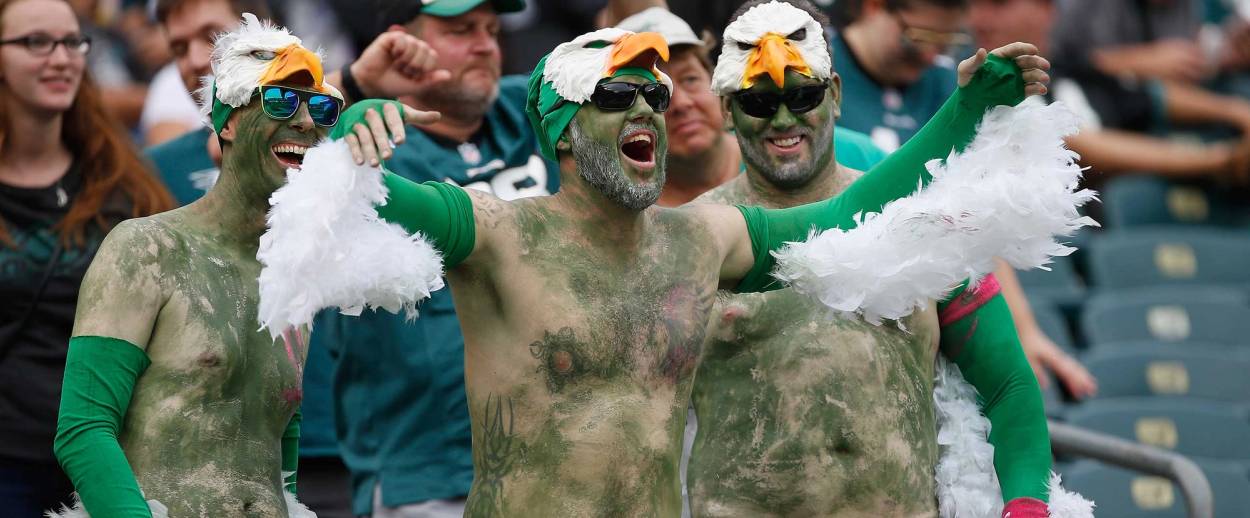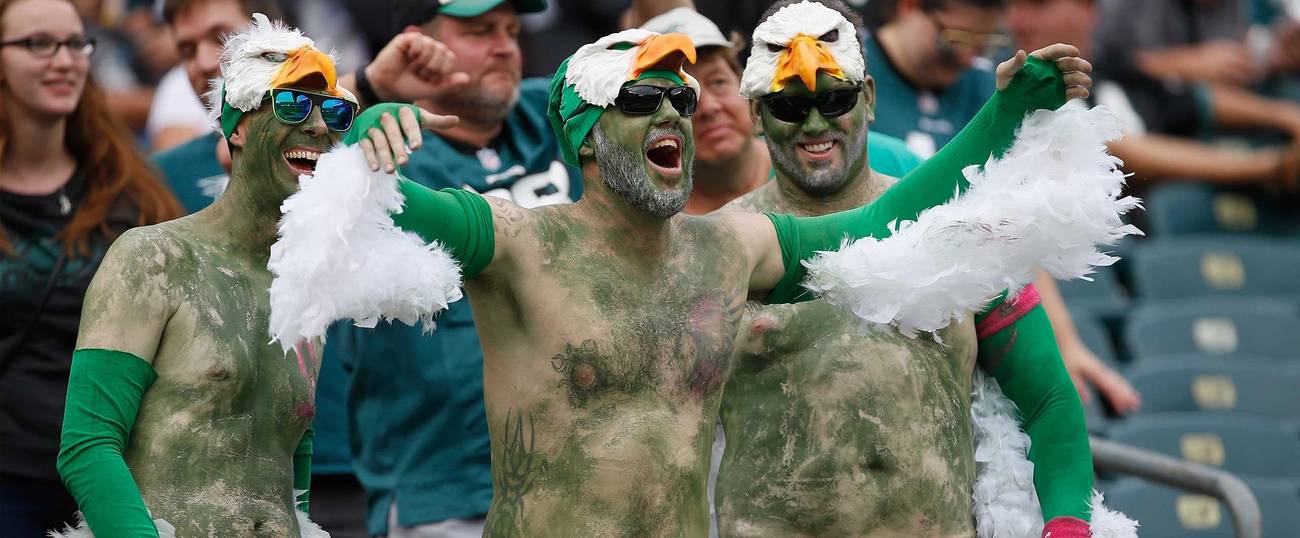Eagles Fans, the NFL’s Most Notorious, Have an Important Spiritual Lesson to Teach Us
We need a little rowdy tribalism




In last week’s torrent of dour news, one story stood apart, a refreshing and delightful pause from the habitual gloom: After the Philadelphia Eagles defeated the Minnesota Vikings and secured their spot in the Super Bowl, the City of Brotherly Love sent its police force to grease Philly’s lampposts with Crisco. The effort was supposed to stop the fans from climbing them. It failed.
I’ve inherited my allegiance to the Eagles through marriage, but it was just such rowdiness that made me really fall in love with the Birds. How horrible are Eagles fans? You can decide for yourself by reading this outraged letter from a Vikings fan reflecting on the boys in white and green who greeted him at Lincoln Financial Field (“I was literally embarrassed to be a human,” the nice man wrote after he was called a bunch of names he had never even heard before). Or you can ask children, the frail, and the faint of heart to leave the room and play this video, which had gone viral in the last few days and which showcases the typical Eagles fan’s verbal dexterity. Or you can you just consider that in its former home, Veterans Stadium, the team chose to endorse its faithful by building a freaking jail inside the stadium itself, complete with a presiding judge, to keep the animals at bay.
I can’t tell you how happy this all makes me.
Why would anyone put up with this behavior, let alone revel in it? Why tolerate such boorishness, inflected as it is with violence and disdainful of all that is kind and beautiful in the world? There’s a good reason, I think, and it has more to do with theology than it does with athletics.
Aptly enough, I first stumbled upon this bit of religious insight in Jerusalem. I’m a fan of the city’s local soccer team, Beitar, and I was attending a game one day when the God of Vengeance soured on his hometown boys. Beitar lost, and the fans set out on a nearby mall, seeking revenge. Happening on a McDonald’s, they attempted arson, pouring their wrath on the Chicken McNuggets before the law swooped in and had the hooligans arrested.
Observing these men, my fellow fans, I felt a strange sort of pride that troubled me. Even though I could never partake in their shenanigans, and would, under any other circumstances, denounce them as vile little vandals, I was gratified to see them senselessly express their disappointment by behaving like a gaggle of Visigoths with clubs in their hands and pillage on their minds. In their own idiotic way, I understood, they were pledging their allegiance to their tribe. It didn’t matter much that their tribe revolved around something as trivial as soccer, or that their way of expressing themselves involved light eruptions of asocial behavior. What mattered is that these men wanted to belong.
And wanting to belong, these days, is a problem.
These days, you’re likely to be told that the only collective you can join without care or concern is the biggest one possible, that of the human race. Globalists are welcome, praised for their humanity, celebrated for their universal worldview that insists that all peoples and places and cultures are, at heart, the same. But say that you have an affinity for your nation, say, or for the particulars of your religion, and suspicions arise: Are you some sort of separatist? And isn’t your preference really a way to mask feelings of supremacy? Because isn’t belonging really about choosing, and choosing really about hierarchy, and hierarchy really about discrimination?
If this sounds comical to you, you haven’t spent much time in graduate seminars, or newsrooms, or think tanks, or even some shuls, where the traditions and identities that have tethered us to each other for millennia have been replaced by the shinier markers of difference that tear us apart. The idea was to usher in justice by toppling the structures of oppression and leaving us all to live freely as individuals, bound only by the biggest umbrella there is, that of the human race writ large. If you’re wondering how well the project’s going, you’re welcome to pick up a newspaper.
And if you think there’s not much harm in imagining ourselves as a big global family of happy and liberated people, observe the faith we now put in the institutions that used to bind us together: In 1991, for example, 72 percent of Americans expressed a great deal or quite a lot of confidence in the institution of the presidency; that number is now at 32 percent. Our schools, which 62 percent of us viewed favorably just three decades ago, are now viewed favorably by only 36 percent of the population. Congress, the banks, big businesses, television news—all the bedrocks of civil society—have taken similar hits. You can find a plethora of culprits for this collective decline, but all are at the very least aided and abetted by an ideology that sees institutions themselves as inherently suspect. On the left, this viewpoint has been expressed by the social justice warriors and their disdain for anything that smacks of undue power. On the right, it’s been championed by the wanton cheerleaders of the free market, all too happy to maximize profits at the expense of everything else, including community.
But not all hope is lost. Some among us still know the value of banding together. Often, these tribalists express their ideas in silly ways, like voting for imperfect candidates or coloring their faces green and attempting to climb up a greased pole. But what they’re really saying is that they see the value in small and tightly knit circles that value loyalty and mutual responsibility and that look for meaning in something bigger than the self and its appetites. These rowdy fans with their profane cheers have little patience for sanctimonious homilies about diversity; real diversity, they know, can come only when real difference is not only tolerated but encouraged, when men and women who pride themselves on their traditions come together not for the purpose of becoming the same but in the hope of inspiring each other with curiosity and with respect and with a little healthy competition. Football fans understand that intuitively; it may take professors of political science a few more decades to catch up.
***
Like this article? Sign up for our Daily Digest to get Tablet Magazine’s new content in your inbox each morning.
Liel Leibovitz is editor-at-large for Tablet Magazine and a host of its weekly culture podcast Unorthodox and daily Talmud podcast Take One. He is the editor of Zionism: The Tablet Guide.